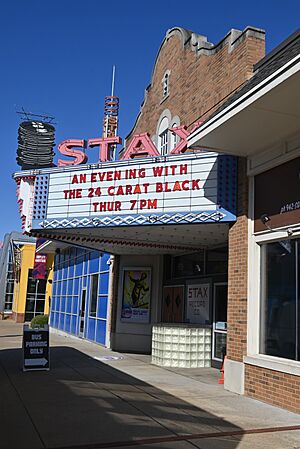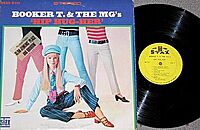Stax Records facts for kids
Quick facts for kids Stax Records |
|
|---|---|
 |
|
| Parent company | Concord |
| Founded | 1957 |
| Founder | Jim Stewart, Estelle Axton |
| Distributor(s) |
|
| Genre | |
| Country of origin | United States |
| Location | Memphis, Tennessee |
Stax Records is a famous American record company from Memphis, Tennessee. It started in 1957 as Satellite Records but changed its name to Stax Records in 1961. The name "Stax" came from the last names of its founders, a brother and sister named Jim Stewart and Estelle Axton.
Stax became known for creating a special kind of music called Southern soul and Memphis soul. The label also released gospel, funk, and blues songs. What made Stax special was its racially integrated team. Black and white musicians, songwriters, and staff worked together during a time of racial tension in the American South. This was very unusual and powerful.
The label's house band, Booker T. & the M.G.'s, was also integrated and played on most of the hit records. This teamwork created a unique "Stax sound" that was a mix of black gospel, blues, and country music.
After the death of its biggest star, Otis Redding, in 1967, and a split with its partner Atlantic Records in 1968, Stax faced many challenges. A new co-owner, Al Bell, tried to help the company grow, but it ran into money problems and had to close in 1975.
Later, the Stax music catalog was bought by Fantasy Records and then by Concord Records. Today, the Stax label is active again. It releases classic songs from its golden years and new music by modern R&B and soul artists.
Contents
History
1957–1961: The Beginning as Satellite Records
Stax Records was founded in 1957 by Jim Stewart in a garage in Memphis. At first, it was called Satellite Records and mostly recorded country music and rockabilly. In 1958, Stewart's sister, Estelle Axton, invested in the company by mortgaging her house. This allowed them to buy better recording equipment.
In 1960, Stewart moved the company into an old movie theater on McLemore Avenue in Memphis. This building would become the famous Stax Studio. The first artists to record there were Rufus Thomas and his daughter Carla Thomas. Their song, "Cause I Love You," became a local hit.
This success got the attention of the bigger Atlantic Records, which agreed to help distribute Satellite's music. Soon after, an instrumental band called the Mar-Keys recorded "Last Night," which became a huge national hit. Another company in California was also named Satellite Records, so in 1961, Stewart and Axton changed their label's name to Stax Records.
1962–1964: Building the Stax Sound
By 1962, Stax had all the pieces to become a major force in R&B music. Several things made the label unique.
The Record Shop and Studio
Estelle Axton ran a record shop in the front of the studio building. This shop helped the Stax team know what music was popular. They would even play newly recorded songs for customers to see how they reacted. The shop was a popular hangout for local teens and future Stax stars.
The studio itself, a converted movie theater, had a sloped floor that created a special, deep sound. Music fans can often tell a Stax recording just by hearing its unique acoustics.
The House Band: Booker T. & the M.G.'s
Instead of hiring different musicians for every session, Stax had its own house band. By 1962, this band was Booker T. & the M.G.'s. It included Booker T. Jones on organ and piano, Steve Cropper on guitar, Lewie Steinberg (later replaced by Donald "Duck" Dunn) on bass, and Al Jackson Jr. on drums.
This band played on nearly every Stax recording. They worked together to create the music on the spot, which was different from other studios where musicians just read sheet music. This creative process helped shape the famous "Stax sound."
Early Stars
In 1962, a powerful singer named Otis Redding joined Stax's sister label, Volt. His first single, "These Arms of Mine," was a hit. Redding became the label's biggest star, releasing one hit after another. Other early stars included Rufus Thomas, Carla Thomas, and William Bell.
1965–1967: The Golden Years
In 1965, Stax made a formal distribution deal with Atlantic Records. This helped Stax songs reach an even wider audience. The songwriting team of Isaac Hayes and David Porter began writing huge hits for the label.
During this time, Stax artists scored many hits. Sam & Dave, who were officially Atlantic artists, recorded their biggest songs like "Soul Man" and "Hold On, I'm Comin'" at Stax, produced by Hayes and Porter. Other major artists included Eddie Floyd, who had a massive hit with "Knock on Wood", and the instrumental group The Bar-Kays.
In 1967, Stax organized a European tour called the "Stax/Volt Revue." It was a huge success and showed how popular soul music had become around the world. For the Stax artists, many of whom were African American, the welcoming crowds in Europe were a powerful experience, especially given the racial problems back home in the United States.
1968: A Time of Change
The year 1968 brought major challenges for Stax. In December 1967, the label's biggest star, Otis Redding, died in a plane crash along with most of the members of the Bar-Kays. This was a terrible loss for the Stax family.
A few months later, Stax's distribution deal with Atlantic Records ended. When Atlantic was sold to a new company, a clause in the contract was discovered. It stated that Atlantic owned all the master recordings of the songs it had distributed for Stax. This meant Stax lost its entire hit catalog from 1960 to 1967.
The label now had to start over without its biggest star and its most famous songs. That same year, civil rights leader Martin Luther King Jr. was assassinated in Memphis. This event deeply shook the city and the Stax community, which had been a symbol of racial harmony.
1968–1972: Rebuilding and New Success
Despite the setbacks, Stax recovered. Al Bell, a marketing executive, became a co-owner and took a leading role. He wanted to rebuild the label's catalog quickly. In 1969, Stax released 27 albums at once to show they were still a major force.
Songwriter and producer Isaac Hayes became a superstar with his album Hot Buttered Soul. In 1971, he recorded the soundtrack for the movie Shaft, which won an Academy Award and became a worldwide sensation.
The label also signed The Staple Singers, a gospel group that crossed over to R&B and had huge hits like "I'll Take You There" and "Respect Yourself." Other new hitmakers included Johnnie Taylor, The Dramatics, and Jean Knight.
In 1972, Stax organized a massive concert in Los Angeles called Wattstax. Known as the "Black Woodstock", the event celebrated black culture and music. It drew over 100,000 people and was turned into a successful movie.
1972–1975: Decline and Closure
To grow even bigger, Al Bell made a distribution deal with CBS Records. However, the partnership did not work well. CBS did not promote Stax records effectively, and Stax began to lose money.
The company struggled to keep up with its rivals like Motown Records. Despite a few hits, like Shirley Brown's "Woman to Woman", Stax slid into debt. In 1975, the company was forced to declare bankruptcy and shut down.
1977–Present: The Stax Legacy Lives On
In 1977, Fantasy Records bought the Stax name and its post-1968 music catalog. For many years, Stax was mainly a reissue label, releasing collections of its classic songs.

The original Stax studio on McLemore Avenue was torn down in 1989. But in 2003, a new building was constructed on the same site: the Stax Museum of American Soul Music. The museum celebrates the history of Stax and soul music and includes a music academy for young students.
In 2004, Concord Records bought Fantasy, and in 2006, they reactivated the Stax label. Today, Stax releases music from new artists like Nathaniel Rateliff & The Night Sweats and Ben Harper, as well as legendary Stax artist William Bell. The spirit of Stax continues to influence music around the world.
Famous Stax Artists
Stax was home to many legendary musicians. Here are some of the most famous artists from its different eras.
1957–1968: The Atlantic Era
- Booker T. & the M.G.'s
- Carla Thomas
- Eddie Floyd
- Isaac Hayes
- Johnnie Taylor
- Otis Redding (Volt)
- Rufus Thomas
- Sam & Dave
- The Bar-Kays (Volt)
- William Bell
1968–1975: The Independent Years
- Albert King
- Isaac Hayes (Enterprise)
- Jean Knight
- Johnnie Taylor
- Little Milton
- The Dramatics (Volt)
- The Staple Singers
- The Soul Children
2006–Present: The Concord Era
- Angie Stone
- Ben Harper
- Lalah Hathaway
- Nathaniel Rateliff & The Night Sweats
- Soulive
- William Bell
See also
 In Spanish: Stax Records para niños
In Spanish: Stax Records para niños
- List of record labels
- Hi Records
- Muscle Shoals Rhythm Section
 | Misty Copeland |
 | Raven Wilkinson |
 | Debra Austin |
 | Aesha Ash |



